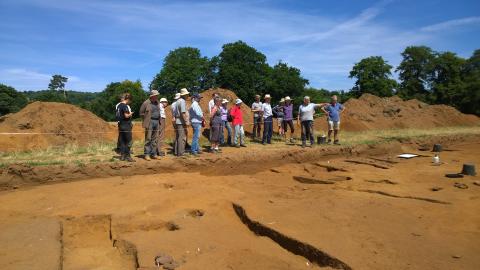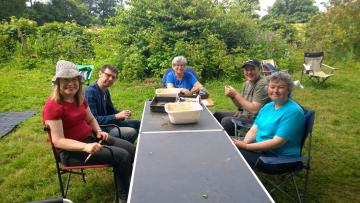
The month of excavation at Abinger has now come to an end. Our 75 volunteers coped admirably with unseasonally hot weather, up to 35C the first few days. Whilst this meant that we lost very little digging time to wet weather it also meant that the ground was baked hard and the colours more muted than we might have hoped for. Despite this we made good progress, with volunteers trowelling and retrowelling areas over and over to gradually uncovering the archaeology beneath. Whist digging has finished there is still plenty of planning and section drawing to complete and this will be done over the next week or so.

In trench 21 we found two buildings that we had never expected to find, although we always knew they or something like them must exist somewhere in the neighbourhood of the villa. Wooden post-hole buildings are notoriously hard to find and interpret, and we have found enough to be able to guess something about the internal layout and use of space. The smaller trench 22 showed evidence for agricultural activity, showing us something about the use of the landscape and how that changed through time. The trenches combined help us to understand how the villa’s landscape looked and functioned. We also have more information about the Iron Age occupation, with a new large grain pit and pottery, and possible glimpses into the Bronze Age and Neolithic.
Our dedicated finds team worked hard to deal with the variety of finds recovered, and tiptoed through the minefield of what to wash, what to dry brush and what to leave until it was more stable e.g. prehistoric pot. They were so organised that they also managed to mark most of the finds, and also flint from previous years.; this means that post-excavation identification can begin at our Abinger Research Centre. More than a tonne of environmental samples were also taken from pit and ditch fills and we hope that we might get evidence for land-use in the form of carbonised grain, seeds, molluscs and small animal bones; the sandy soil means that such preservation is likely to be poor but it is worth a try.


